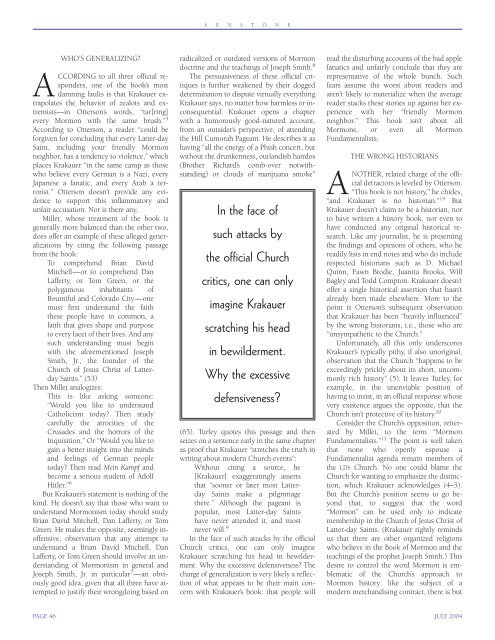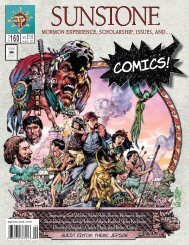is there a place for heavenly mother in mormon theology?
is there a place for heavenly mother in mormon theology?
is there a place for heavenly mother in mormon theology?
You also want an ePaper? Increase the reach of your titles
YUMPU automatically turns print PDFs into web optimized ePapers that Google loves.
S U N S T O N E<br />
WHO’S GENERALIZING?<br />
ACCORDING to all three official responders,<br />
one of the book’s most<br />
damn<strong>in</strong>g faults <strong>is</strong> that Krakauer extrapolates<br />
the behavior of zealots and extrem<strong>is</strong>ts—<strong>in</strong><br />
Otterson’s words, “tar[r<strong>in</strong>g]<br />
every Mormon with the same brush.” 5<br />
Accord<strong>in</strong>g to Otterson, a reader “could be<br />
<strong>for</strong>given <strong>for</strong> conclud<strong>in</strong>g that every Latter-day<br />
Sa<strong>in</strong>t, <strong>in</strong>clud<strong>in</strong>g your friendly Mormon<br />
neighbor, has a tendency to violence,” which<br />
<strong>place</strong>s Krakauer “<strong>in</strong> the same camp as those<br />
who believe every German <strong>is</strong> a Nazi, every<br />
Japanese a fanatic, and every Arab a terror<strong>is</strong>t.”<br />
Otterson doesn’t provide any evidence<br />
to support th<strong>is</strong> <strong>in</strong>flammatory and<br />
unfair accusation. Nor <strong>is</strong> <strong>there</strong> any.<br />
Millet, whose treatment of the book <strong>is</strong><br />
generally more balanced than the other two,<br />
does offer an example of these alleged generalizations<br />
by cit<strong>in</strong>g the follow<strong>in</strong>g passage<br />
from the book:<br />
To comprehend Brian David<br />
Mitchell—or to comprehend Dan<br />
Lafferty, or Tom Green, or the<br />
polygamous <strong>in</strong>habitants of<br />
Bountiful and Colorado City—one<br />
must first understand the faith<br />
these people have <strong>in</strong> common, a<br />
faith that gives shape and purpose<br />
to every facet of their lives. And any<br />
such understand<strong>in</strong>g must beg<strong>in</strong><br />
with the a<strong>for</strong>ementioned Joseph<br />
Smith, Jr., the founder of the<br />
Church of Jesus Chr<strong>is</strong>t of Latterday<br />
Sa<strong>in</strong>ts.” (53)<br />
Then Millet analogizes:<br />
Th<strong>is</strong> <strong>is</strong> like ask<strong>in</strong>g someone:<br />
“Would you like to understand<br />
Catholic<strong>is</strong>m today? Then study<br />
carefully the atrocities of the<br />
Crusades and the horrors of the<br />
Inqu<strong>is</strong>ition.” Or “Would you like to<br />
ga<strong>in</strong> a better <strong>in</strong>sight <strong>in</strong>to the m<strong>in</strong>ds<br />
and feel<strong>in</strong>gs of German people<br />
today? Then read Me<strong>in</strong> Kampf and<br />
become a serious student of Adolf<br />
Hitler.” 6<br />
But Krakauer’s statement <strong>is</strong> noth<strong>in</strong>g of the<br />
k<strong>in</strong>d. He doesn’t say that those who want to<br />
understand Mormon<strong>is</strong>m today should study<br />
Brian David Mitchell, Dan Lafferty, or Tom<br />
Green. He makes the opposite, seem<strong>in</strong>gly <strong>in</strong>offensive,<br />
observation that any attempt to<br />
understand a Brian David Mitchell, Dan<br />
Lafferty, or Tom Green should <strong>in</strong>volve an understand<strong>in</strong>g<br />
of Mormon<strong>is</strong>m <strong>in</strong> general and<br />
Joseph Smith, Jr. <strong>in</strong> particular 7 —an obviously<br />
good idea, given that all three have attempted<br />
to justify their wrongdo<strong>in</strong>g based on<br />
radicalized or outdated versions of Mormon<br />
doctr<strong>in</strong>e and the teach<strong>in</strong>gs of Joseph Smith. 8<br />
The persuasiveness of these official critiques<br />
<strong>is</strong> further weakened by their dogged<br />
determ<strong>in</strong>ation to d<strong>is</strong>pute virtually everyth<strong>in</strong>g<br />
Krakauer says, no matter how harmless or <strong>in</strong>consequential.<br />
Krakauer opens a chapter<br />
with a humorously good-natured account,<br />
from an outsider’s perspective, of attend<strong>in</strong>g<br />
the Hill Cumorah Pageant. He describes it as<br />
hav<strong>in</strong>g “all the energy of a Ph<strong>is</strong>h concert, but<br />
without the drunkenness, outland<strong>is</strong>h hairdos<br />
(Brother Richard’s comb-over notwithstand<strong>in</strong>g)<br />
or clouds of marijuana smoke”<br />
In the face of<br />
such attacks by<br />
the official Church<br />
critics, one can only<br />
imag<strong>in</strong>e Krakauer<br />
scratch<strong>in</strong>g h<strong>is</strong> head<br />
<strong>in</strong> bewilderment.<br />
Why the excessive<br />
defensiveness?<br />
(65). Turley quotes th<strong>is</strong> passage and then<br />
seizes on a sentence early <strong>in</strong> the same chapter<br />
as proof that Krakauer “stretches the truth <strong>in</strong><br />
writ<strong>in</strong>g about modern Church events”:<br />
Without cit<strong>in</strong>g a source, he<br />
[Krakauer] exaggerat<strong>in</strong>gly asserts<br />
that “sooner or later most Latterday<br />
Sa<strong>in</strong>ts make a pilgrimage<br />
<strong>there</strong>.” Although the pageant <strong>is</strong><br />
popular, most Latter-day Sa<strong>in</strong>ts<br />
have never attended it, and most<br />
never will. 9<br />
In the face of such attacks by the official<br />
Church critics, one can only imag<strong>in</strong>e<br />
Krakauer scratch<strong>in</strong>g h<strong>is</strong> head <strong>in</strong> bewilderment.<br />
Why the excessive defensiveness? The<br />
charge of generalization <strong>is</strong> very likely a reflection<br />
of what appears to be their ma<strong>in</strong> concern<br />
with Krakauer’s book: that people will<br />
read the d<strong>is</strong>turb<strong>in</strong>g accounts of the bad apple<br />
fanatics and unfairly conclude that they are<br />
representative of the whole bunch. Such<br />
fears assume the worst about readers and<br />
aren’t likely to materialize when the average<br />
reader stacks these stories up aga<strong>in</strong>st her experience<br />
with her “friendly Mormon<br />
neighbor.” Th<strong>is</strong> book <strong>is</strong>n’t about all<br />
Mormons, or even all Mormon<br />
Fundamental<strong>is</strong>ts.<br />
THE WRONG HISTORIANS<br />
ANOTHER, related charge of the official<br />
detractors <strong>is</strong> leveled by Otterson:<br />
“Th<strong>is</strong> book <strong>is</strong> not h<strong>is</strong>tory,” he chides,<br />
“and Krakauer <strong>is</strong> no h<strong>is</strong>torian.” 14 But<br />
Krakauer doesn’t claim to be a h<strong>is</strong>torian, nor<br />
to have written a h<strong>is</strong>tory book, nor even to<br />
have conducted any orig<strong>in</strong>al h<strong>is</strong>torical research.<br />
Like any journal<strong>is</strong>t, he <strong>is</strong> present<strong>in</strong>g<br />
the f<strong>in</strong>d<strong>in</strong>gs and op<strong>in</strong>ions of others, who he<br />
readily l<strong>is</strong>ts <strong>in</strong> end notes and who do <strong>in</strong>clude<br />
respected h<strong>is</strong>torians such as D. Michael<br />
Qu<strong>in</strong>n, Fawn Brodie, Juanita Brooks, Will<br />
Bagley and Todd Compton. Krakauer doesn’t<br />
offer a s<strong>in</strong>gle h<strong>is</strong>torical assertion that hasn’t<br />
already been made elsewhere. More to the<br />
po<strong>in</strong>t <strong>is</strong> Otterson’s subsequent observation<br />
that Krakauer has been “heavily <strong>in</strong>fluenced”<br />
by the wrong h<strong>is</strong>torians, i.e., those who are<br />
“unsympathetic to the Church.”<br />
Un<strong>for</strong>tunately, all th<strong>is</strong> only underscores<br />
Krakauer’s typically pithy, if also unorig<strong>in</strong>al,<br />
observation that the Church “happens to be<br />
exceed<strong>in</strong>gly prickly about its short, uncommonly<br />
rich h<strong>is</strong>tory” (5). It leaves Turley, <strong>for</strong><br />
example, <strong>in</strong> the unenviable position of<br />
hav<strong>in</strong>g to <strong>in</strong>s<strong>is</strong>t, <strong>in</strong> an official response whose<br />
very ex<strong>is</strong>tence argues the opposite, that the<br />
Church <strong>is</strong>n’t protective of its h<strong>is</strong>tory. 10<br />
Consider the Church’s opposition, reiterated<br />
by Millet, to the term “Mormon<br />
Fundamental<strong>is</strong>ts.” 11 The po<strong>in</strong>t <strong>is</strong> well taken<br />
that none who openly espouse a<br />
Fundamental<strong>is</strong>t agenda rema<strong>in</strong> members of<br />
the LDS Church. No one could blame the<br />
Church <strong>for</strong> want<strong>in</strong>g to emphasize the d<strong>is</strong>t<strong>in</strong>ction,<br />
which Krakauer acknowledges (4–5).<br />
But the Church’s position seems to go beyond<br />
that, to suggest that the word<br />
“Mormon” can be used only to <strong>in</strong>dicate<br />
membership <strong>in</strong> the Church of Jesus Chr<strong>is</strong>t of<br />
Latter-day Sa<strong>in</strong>ts. (Krakauer rightly rem<strong>in</strong>ds<br />
us that <strong>there</strong> are other organized religions<br />
who believe <strong>in</strong> the Book of Mormon and the<br />
teach<strong>in</strong>gs of the prophet Joseph Smith.) Th<strong>is</strong><br />
desire to control the word Mormon <strong>is</strong> emblematic<br />
of the Church’s approach to<br />
Mormon h<strong>is</strong>tory: like the subject of a<br />
modern merchand<strong>is</strong><strong>in</strong>g contract, <strong>there</strong> <strong>is</strong> but<br />
PAGE 46 JULY 2004
















